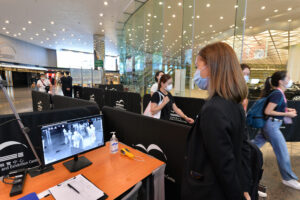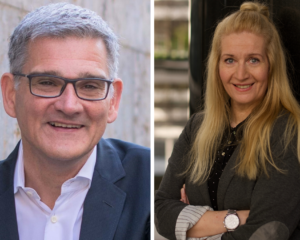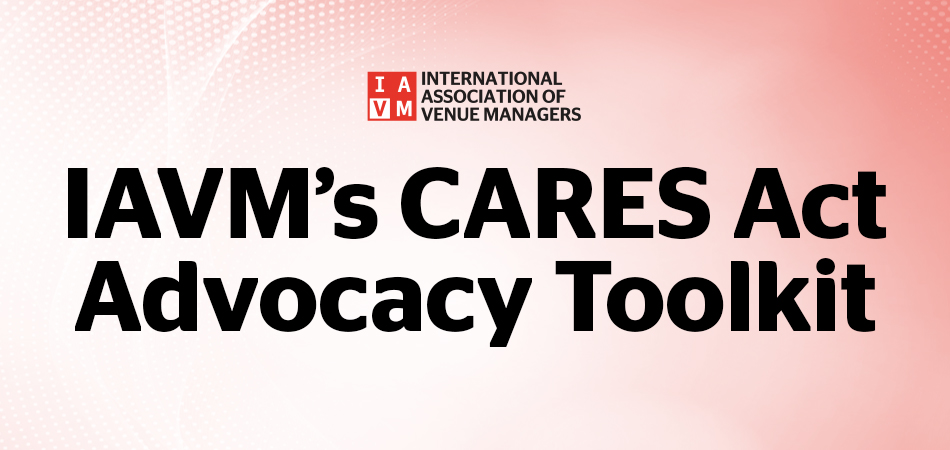Hong Kong’s First Exhibition Since COVID-19 Pandemic Held Successfully With Preventive Measures
By Mabel Hung
The Hong Kong Convention and Exhibition Centre (“HKCEC”) welcomed events back to Hong Kong on May 22-24. With a series of preventive measures in place, the HKCEC welcomed the city’s first exhibition since the COVID-19
pandemic. The 98th Hong Kong Wedding Fair, a three-day local consumer exhibition rescheduled from February, was held successfully and attracted soon-to-weds and couples for wedding products and services.
Hong Kong Convention and Exhibition Centre (Management) Limited (“HML”), the private management company  responsible for daily operation of the venue, has stepped up preventive measures to ensure a safe, hygienic, and comfortable environment for exhibitors and visitors.
responsible for daily operation of the venue, has stepped up preventive measures to ensure a safe, hygienic, and comfortable environment for exhibitors and visitors.
“HML is all set to welcome events back to the HKCEC,” said HML Managing Director Monica Lee-Muller. “The health, safety and well-being of staff members and visitors have always been our top priority. The HML team has been working closely with organizers to reschedule events impacted by the pandemic, and to implement necessary measures to address health and hygiene concerns. With the success of the Hong Kong Wedding Fair, we can demonstrate our commitment of providing professional services and customer care for event organizers
and attendees.“
The HML team cooperated with the organizer to implement special preventive measures in event arrangements, such as floor plan design, queuing logistics, F&B provision etc. All arrangements complied with the requirements imposed by the local authority, and made reference to industry guidelines and best practices.
 All visitors, exhibitors, contractors, and HML staff members were required to wear face masks at all times and had their body temperature screened before entering the HKCEC. Social distance practicing was implemented at busy locations such as the Fair ticket counters, food and beverage outlets, and washrooms, where queues were expected.
All visitors, exhibitors, contractors, and HML staff members were required to wear face masks at all times and had their body temperature screened before entering the HKCEC. Social distance practicing was implemented at busy locations such as the Fair ticket counters, food and beverage outlets, and washrooms, where queues were expected.
Sanitation and disinfection were carried out by HML staff regularly to ensure venue hygiene. Public facilities and furniture such as escalator handrails, door knobs, lift panels, tables, and chairs in the exhibition stands, etc., were sanitised frequently. The exhibition hall was disinfected at the end of each show day.
To learn more about the preventive measures at the HKCEC in response to coronavirus, click here.
A video about HML’s measures to ensure venue hygiene and to safeguard the health of
event visitors may be found here.
Mabel Hung is Director – Communications & Sustainability for the Hong Kong Convention & Exhibition Centre.
Top Photo: Temperature screening was required for all visitors, exhibitors, contractors and staff before entering the HKCEC.
Bottom Photo: Cleaning and disinfecting work was carried out by HML staff in event venues frequently.
How Event Venues Will be Changing to Help Keep Attendees and Staff Safe
By Mark Herrera
The reality of the event industry is one of unrelentingly disruptive change. This change is happening at an unprecedented pace. Venues of all types must successfully adapt and operate under a set of rules and expectations that are constantly in flux based on the current health crisis. The challenge of this disruption has posed an economical and physical risk but out of this we will see how resilient the industry is and embrace the growth opportunities.
IAVM, having significant influence in a global industry, has a civic duty to assure we provide safe, secure, and  healthy environments within all public facilities where crowds assemble. We are an association with a mission to educate, advocate for, and inspire public assembly venue professionals, worldwide.
healthy environments within all public facilities where crowds assemble. We are an association with a mission to educate, advocate for, and inspire public assembly venue professionals, worldwide.
We are working collectively with all venue types, other organizations and associations to include suppliers, meeting planners, organizers and their respective leadership alongside the federal government and working groups tasked to gather data, poll the sectors, and conduct research as the industry moves toward recovery and identifying what the new “norm” will look like.
Event venues will follow medical and governmental guidance and not circumvent the science of any pandemic. All those working events will follow recovery written guides and remain flexible to assure all attendees to include event staff, suppliers, and planners are the top priority.
Top-line safety considerations for all venues are to allow healthy people to enjoy the facility and event; however, enhanced protective measures such as face coverings and hand washing stations will be more common. Managing the crowd density to assure that physical distancing guidelines are adhered to during ingress and egress will be heavily monitored with physical barriers strategically placed in areas where crowds can be controlled. High-touch surfaces will be identified and enhanced, and cleaning and sanitization will be part of the facility written protocols. Prior to attending all events messaging and communication with employees and guests to include signage on how to prevent the spread of germs will be a common practice. Facility design and touchless points of sale will be more common than before to avoid the transmission of any communicable disease.
IAVM has partnered with a Global Bio-risk advisory council considered as a division of one of the leading trade associations for the cleaning industry worldwide. Through this partnership all other venues can apply to a performance-based accreditation program that helps facilities demonstrate they have the work practices, procedures, and protocols to prepare, respond, and recover from outbreaks and pandemics as it pertains to deep cleaning and sanitization.
In conclusion, it is our goal to collectively come together and make every reasonable effort to provide a safe and healthy environment for those working or attending all events. Although there is no guarantee of a “zero risk” environment, we will continue to implement and measure a means to mitigate all risks associated with this health crisis and we will do it together.
As we move forward, events will not be date-driven and rather data-driven to assure we protect the most important asset, people.
Mark Herrera is Director of Education & Life Safety for IAVM. This article was published in smartmeetings.com.
EventBooking Expands Team to Europe
By Kalyn Sisco
EventBooking, a cloud-based venue software company that serves over 1,000 clients worldwide, announced that they now have local representation in Europe.
To further expand EventBooking’s global footprint, President Steve Mackenzie believed it was the right time to spearhead more localized efforts in Europe, as the company did so last year in the Asia Pacific region. Tobias Lienhard and Jutta Kretzer are the appointed partners to do co—contributing to the sales, support, and implementation of VenueOps, EventBooking’s latest venue management application which debuted in 2017.
“I am absolutely delighted to announce a partnership in Europe with two incredibly talented former colleagues, Mr. Tobias Lienhard and Ms. Jutta Kretzer,” Mackenzie said. “Both have been in the venue industry for most of their careers and are a perfect fit for EventBooking. They both share our passion for providing the same top-notch service we offer in other parts of the world.”
Mr. Tobias Lienhard and Ms. Jutta Kretzer,” Mackenzie said. “Both have been in the venue industry for most of their careers and are a perfect fit for EventBooking. They both share our passion for providing the same top-notch service we offer in other parts of the world.”
Tobias will preside over sales efforts in the region, while Jutta will provide implementation and support services to clients. Both are based in Germany and speak multiple languages. EventBooking currently serves over 50 venues in the region, including the 02 (London), AccorHotels Hotel Arena (Paris), and Circuit Barcelona Catalunya (Barcelona).
In yet another step to better serve the international community, VenueOps will be available in German, French, and Spanish in just a few days. In regard to international security, EventBooking already offers hosting services in Europe via Amazon Web Services (AWS) so all data remains safe and secure.
Kalyn Sisco is Marketing Manager at EventBooking.
IAVM’s CARES Act Advocacy Toolkit
IAVM has been working hard with TwinLogic Strategies to ensure that the needs of our members are met under the CARES Act. Now, we need your help to voice your venue’s story to your congressional members. Our 7,000+ members, and the products and services that they provide, touch more than 300 million Americans annually. In order to bring the story of how the COVID-19 pandemic has negatively affected you, their their constituents”, we need you to reach out to those who have legislative decision-making powers and help drive the needs of our industry home.
To assist, IAVM is providing access to an Advocacy Toolkit. In this kit, you will find a general letter, which we encourage all members to send to their Senators and Representatives. You will also find social media post samples and call talking points, to help better guide you when making posts, or when you speak with your congressional members on the phone. Please take a moment and look over the toolkit and to help IAVM advocate for assistance in the recovery of our industry.
Find out more by clicking HERE
IAVM Stays Front and Center Through Radio, Print in Addressing Ongoing Pandemic
By R.V. Baugus
When IAVM Director of Education and Life Safety Mark Herrera is not on the road he is … wait, isn’t Mark Herrera always on the road? Well, not so much now as Herrera — like pretty much the rest of us during the current pandemic — is doing his best to be a responsible citizen and adhere to the safety protocols that have been set before us.
Herrera, as many an IAVM member knows, racks up the frequent flyer miles while visiting member venues to lead his renowned safety and security programs, including Situational Awareness and Active Shooter, among others.
So, even though Herrera is mostly “homebound,” he is still much in demand to comment on the ongoing COVID-19 crisis. We point you to three links that contain some of the latest appearances for Herrera in both print and over the radio airwaves.
Just know that Mark — and your entire IAVM team — strive to continue serving members proactively in matters of urgent response. We hope that you will enjoy the read and listen to some of the latest efforts that Mark shared covering a variety of topics on current and post-COVID.
How Hotels, Convention Centers, Airlines Will Keep Travelers Safe
Do you want to receive a Front Row News weekly digest?
Categories
- Allied (861)
- Architecture (147)
- Arenas (747)
- Career (897)
- Convention Centers (895)
- Education (623)
- Events (1,544)
- Food & Beverage (193)
- Foundation (113)
- Guest Experience (1,496)
- Industry News (2,270)
- Leadership (1,888)
- Marketing (150)
- Membership (2,000)
- Music (213)
- Performing Arts Centers (454)
- Professional Development (409)
- Research (127)
- Safety & Security (442)
- Sports (763)
- Stadiums (608)
- Student (159)
- Technology (516)
- Ticketing (92)
- Touring (82)
- Trends (364)
- Uncategorized (725)
- Universities (218)
- Video (25)
- Young Professional (198)
Twitter Feed
- Twitter feed loading
Recent Posts
- McNamara Named General Manager of Will Rogers Memorial Center
- Matt Rife Breaks Record for Most Tickets Sold for a Comedy Show at Honda Center
- The Events Industry Council Recognizes the Miami Beach Convention Center (MBCC) for Achieving Gold Level Sustainability Certification
- Raleigh Convention Center Shares Designs of Upcoming Expansion
- Acrisure Arena Wraps ‘Magnificent 7’ with Record-Setting Week of Live Entertainment, Welcoming Fans from All 50 States
Categories
- Allied
- Architecture
- Arenas
- Career
- Convention Centers
- Education
- Events
- Food & Beverage
- Foundation
- Guest Experience
- Industry News
- Leadership
- Marketing
- Membership
- Music
- Performing Arts Centers
- Professional Development
- Research
- Safety & Security
- Sports
- Stadiums
- Student
- Technology
- Ticketing
- Touring
- Trends
- Uncategorized
- Universities
- Video
- Young Professional
Archives
- November 2025
- October 2025
- September 2025
- August 2025
- July 2025
- June 2025
- May 2025
- April 2025
- March 2025
- February 2025
- January 2025
- December 2024
- November 2024
- October 2024
- September 2024
- August 2024
- July 2024
- June 2024
- May 2024
- April 2024
- March 2024
- February 2024
- January 2024
- December 2023
- November 2023
- October 2023
- September 2023
- August 2023
- July 2023
- June 2023
- May 2023
- April 2023
- March 2023
- February 2023
- January 2023
- December 2022
- November 2022
- October 2022
- September 2022
- August 2022
- July 2022
- June 2022
- May 2022
- April 2022
- March 2022
- February 2022
- January 2022
- December 2021
- November 2021
- October 2021
- September 2021
- August 2021
- July 2021
- June 2021
- May 2021
- April 2021
- March 2021
- February 2021
- January 2021
- December 2020
- November 2020
- October 2020
- September 2020
- August 2020
- July 2020
- June 2020
- May 2020
- April 2020
- March 2020
- February 2020
- January 2020
- December 2019
- November 2019
- October 2019
- September 2019
- August 2019
- July 2019
- June 2019
- May 2019
- April 2019
- March 2019
- February 2019
- January 2019
- December 2018
- November 2018
- October 2018
- September 2018
- August 2018
- July 2018
- June 2018
- May 2018
- April 2018
- March 2018
- February 2018
- January 2018
- December 2017
- November 2017
- October 2017
- September 2017
- August 2017
- July 2017
- June 2017
- May 2017
- April 2017
- March 2017
- February 2017
- January 2017
- December 2016
- November 2016
- October 2016
- September 2016
- August 2016
- July 2016
- June 2016
- May 2016
- April 2016
- March 2016
- February 2016
- January 2016
- December 2015
- November 2015
- October 2015
- September 2015
- August 2015
- July 2015
- June 2015
- May 2015
- April 2015
- March 2015
- February 2015
- January 2015
- December 2014
- November 2014
- October 2014
- September 2014
- August 2014
- July 2014
- June 2014
- May 2014
- April 2014
- March 2014
- February 2014
- January 2014
- December 2013
- November 2013
- October 2013
- September 2013
- August 2013
- July 2013
- June 2013
- May 2013
- April 2013
- March 2013
- February 2013
- January 2013
- May 2012
- March 2012
- December 2011
- November 2011
- October 2011
Recent Comments
- Frank Bradshaw, Ph.D., CVE on John Meyer, CVE, a Tireless Advocate of Certification for Venue Professionals, Has Died
- Neil Sulkes on Hilary Hartung, Friend to Many in Venue Marketing, Has Left Us
- Jason Parker, CVE on The Devastation of Hurricane Helene and How We Can Support One Another
- Larry Perkins on Touhey Testifies Against Speculative Ticketing Before Congressional Subcommittee
- Peter Secord on Major Players for Planned Elkhart Amphitheater Were in the Mix at VenueConnect

